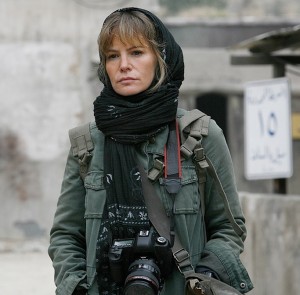Tribeca Reviews & Talks: The Shattered Moment
GALO: Building a character around a particular career like that is a dramatic choice. People like the award-winning journalist Marie Colvin, who died while reporting, for instance. I thought of that in your character Lee, the drive to go back into battle. Have you been to the Middle East?
JW: No I haven’t. I’ve looked at Europe but I haven’t traveled to dangerous places.
GALO: But it made sense to put your character in those places.
JW: Oh, yes. A lot of the movie is about her attraction to danger. Choosing to get involved with the guy she does, he’s not a safe bet. He’s a dark figure.
GALO: And the relationship with the daughter, that unease between them, because Lee has her career and her daughter has become a separate figure.
JW: Yes.
GALO: The opening graphics that set the scene were so beautifully rendered.
JW: That was Karin Fong at Imaginary Forces.
GALO: And the opening music which also set the mood.
JW: Nathan Larson. And the still photographs are by Lynsey Adarrio, a war photographer who works for The New York Times, who was actually captured in Libya and survived. Those are mainly her photographs, and then my husband who was in charge of photography for the film filled in with the rest.
GALO: There’s a moment at the very end of the film where Lee goes back to Afghanistan and as she’s shooting, it’s as if her mind is playing tricks on her again…as if she’s back in the previous situation before the bombing.
JW: That’s right but the interpretation of that ending is very ambiguous. It’s not clear. Does this mean she’s losing her mind again, or has she come to a new place and she can do her job.
GALO: You’re rooting for her to do that; in your way of working, what about choosing Jennifer Jason Leigh? She has a distant quality about her that’s hard to pin down, something hypnotic. Did you choose the actors right away?
JW: I always loved her work. The casting director actually suggested her and I thought that was a very interesting idea, I thought she could bring a lot to this movie. She has the right quality — I totally believe her as a war photographer, which is no easy feat.
GALO: And the daughter?
JW: She came in and read for us and I just thought she was amazing. I wanted the daughter to be somebody who was capable of murder and she had that kind of strength. And at the same time, she can be very vulnerable and adorable.
GALO: Is she very young?
JW: I think she was 22 when we made the movie. I’m not absolutely sure.
GALO: And in picking the rest of the crew — had you worked with them before? Your previous film, Easy — I don’t know about that one. Is it a suspense film as well?
JW: Not at all. It’s a dramedy about a young woman’s struggle to have a good relationship.
GALO: That’s an eternal struggle.
JW: Yes. (Laughter)
GALO: Had you and Gloria Norris been directly involved in developing scripts before?
JW: Gloria was the producer on Easy but I wrote the script. Gloria and I were co-writers on this script.
GALO: What was your early interest in film? As a young person, were you attracted to a certain genre?
JW: I changed careers. I used to be in academia. I started out writing about film, I actually was writing about art too. I did everything for my PhD except my dissertation and taught, and then I realized this is not what I want to be, so I basically made the switch.
GALO: But you were writing about film even then.
JW: I always loved movies when I was young.
GALO: You mentioned Hitchcock earlier as an influence. Were there any others?
JW: I love Antonioni. And I loved Cassavetes, who’s very different from both of those other two people.
GALO: He wasn’t afraid to take risks and just let things happen.
JW: I also love Jane Campion’s films. She’s a wonderful director.
GALO: So I’m sure this film has been an adventure for you. Do you have another in the works?
JW: I have another one that I’ve written part of — it takes place in 1970 and it’s supposed to be based upon the sexual revolution as seen through this particular family.
GALO: I remember that was around the time of the famous women’s march down Fifth Avenue — Gloria Steinem and Bella Abzug…does your film touch on all of that?
JW: It’s more about the sexual revolution, which relates to feminism but also relates to politics in general.
GALO: Are you and Gloria working on that together?
JW: No, I’m doing that alone.
GALO: Will it touch upon suspense?
JW: There will be a lot of surprises, but I don’t know how suspenseful.
GALO: Well, stylistically it’s great to find a woman like yourself doing work in that way.
JW: Thank you.
“The Moment” opened at The Tribeca Film Festival in New York City on April 21, with its last public screening on April 25.

Featured image: Character name: Lee; actress: Jennifer Jason Leigh. Photo Credit: James Welling.

